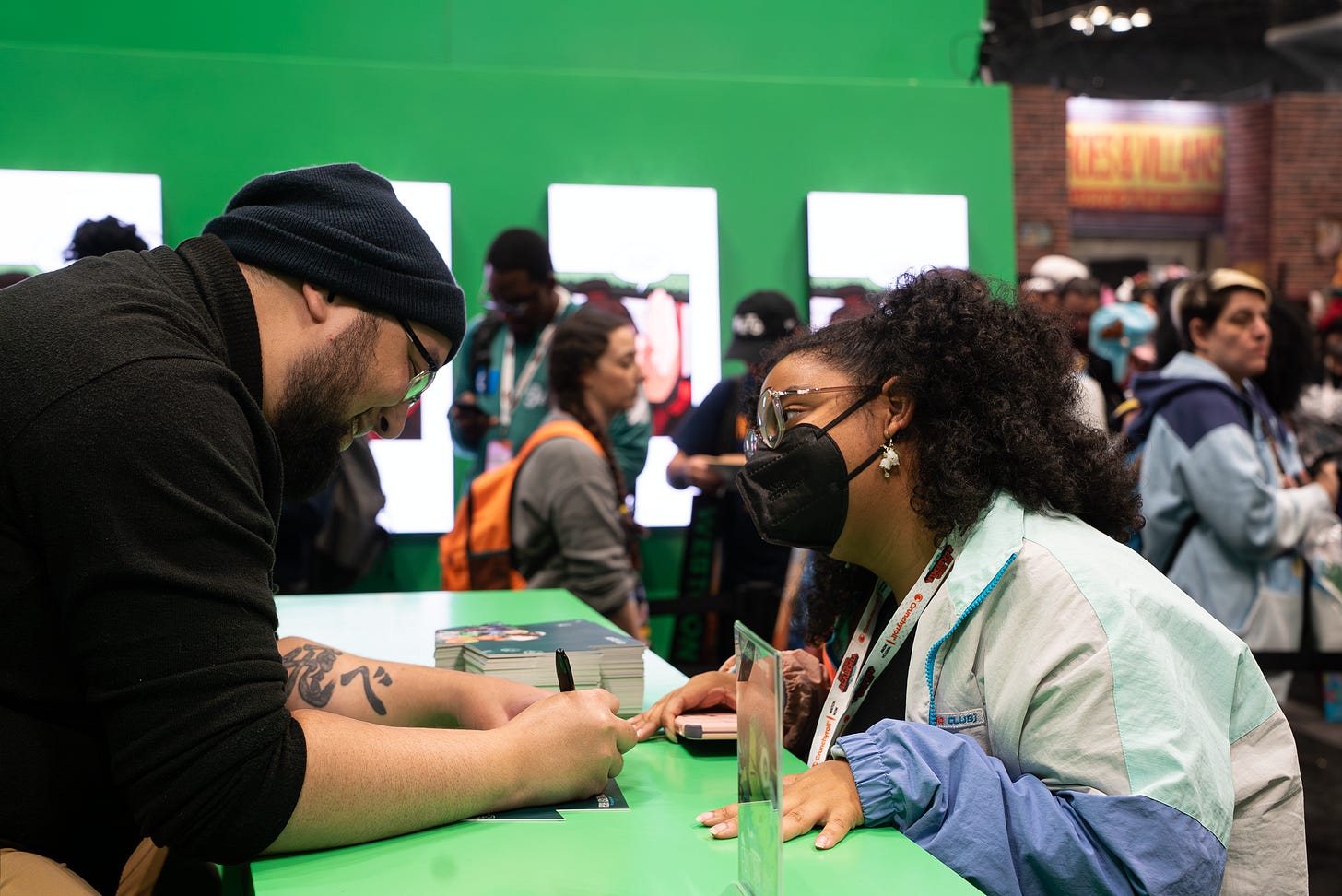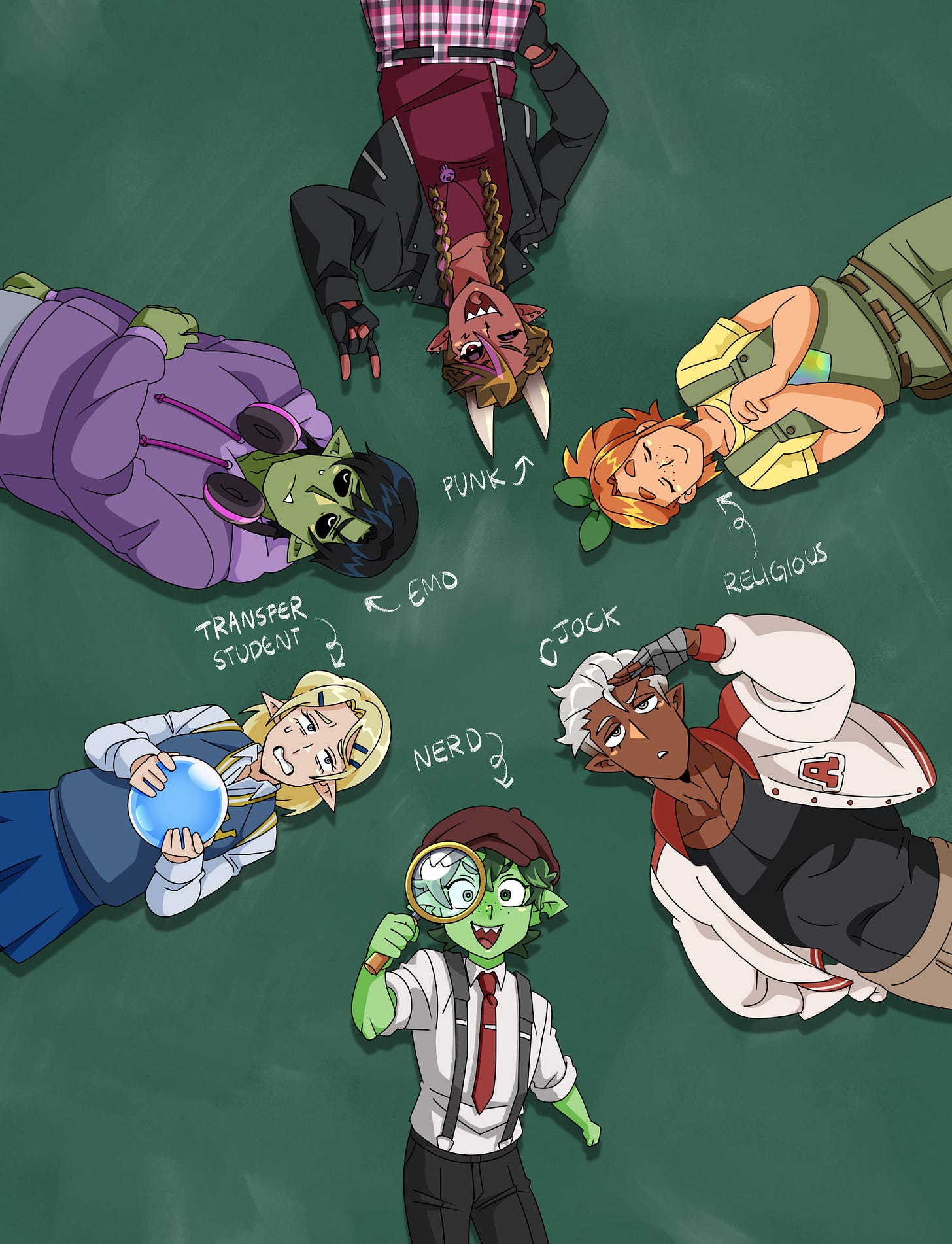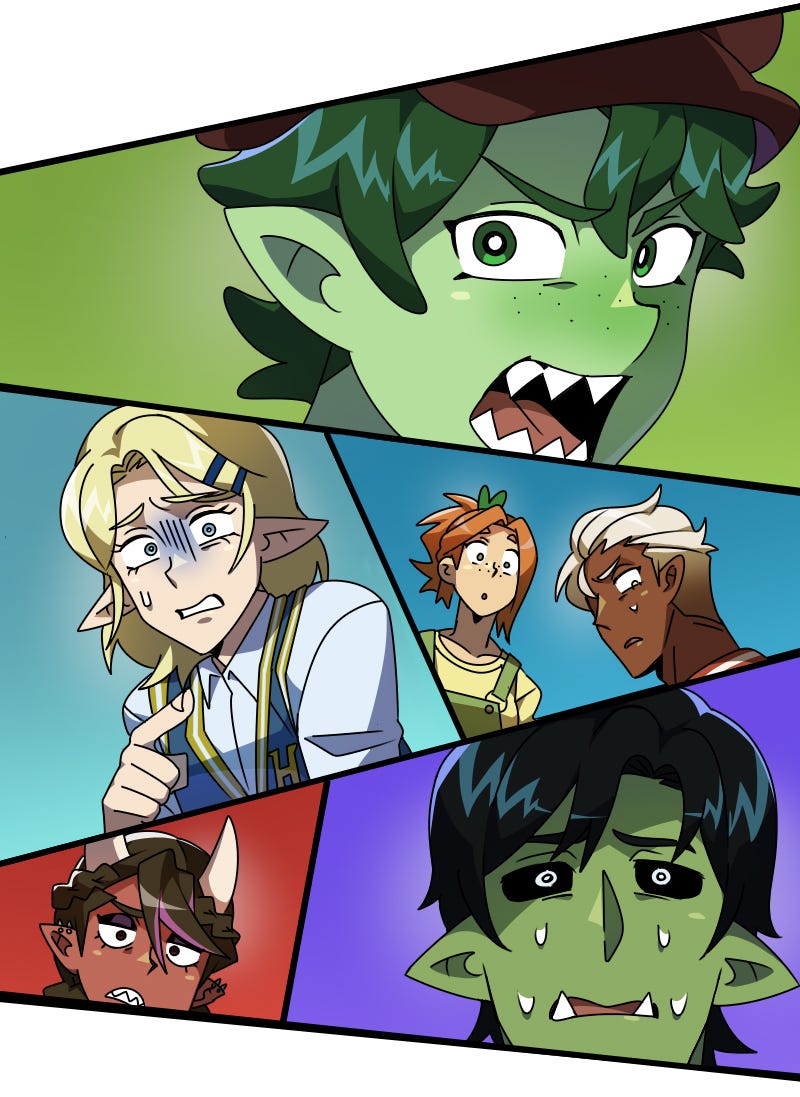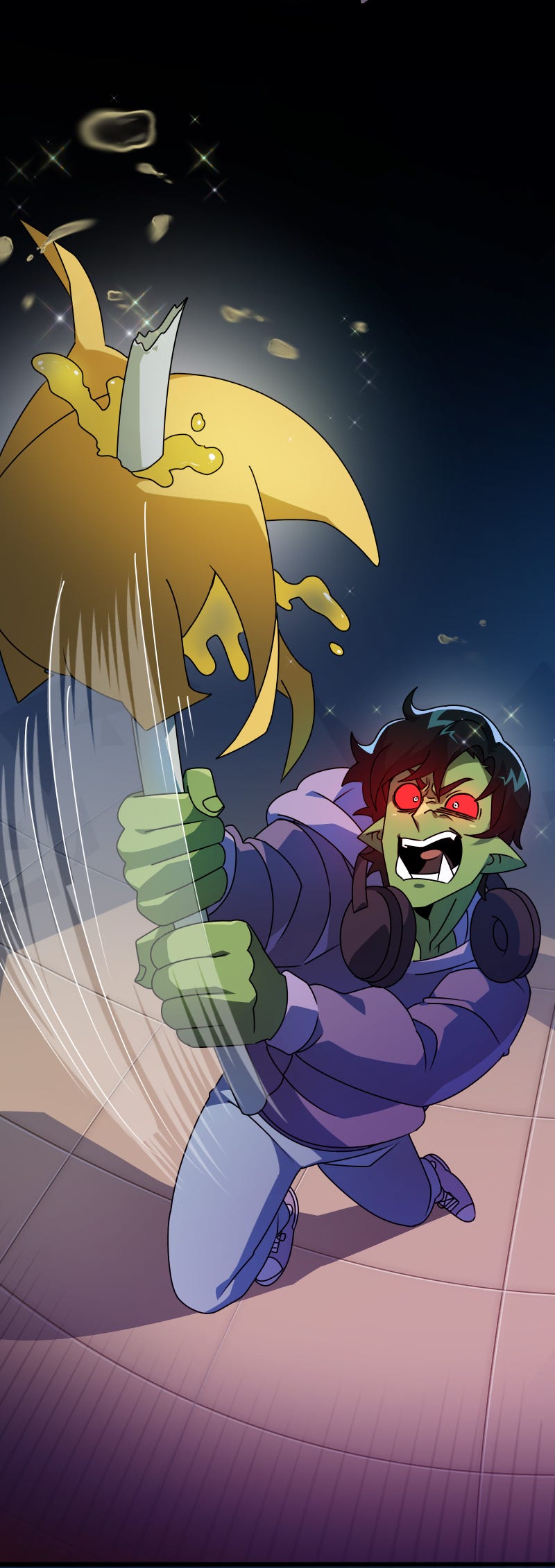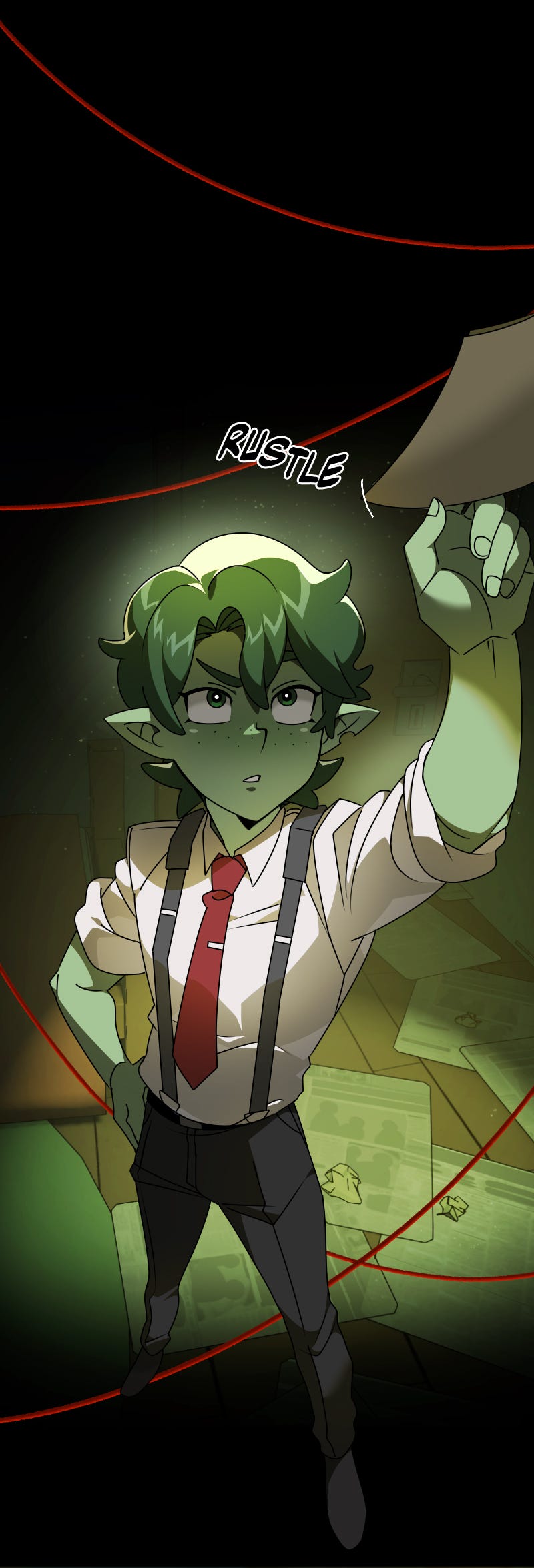Numlock Sunday: Derek V. Song talks Fantasy High
By Walt Hickey
Welcome to the Numlock Sunday edition.
This week, I spoke to Derek V Song, who is the writer of the Fantasy High comic on Webtoon.
Originally a web series from Dropout, Derek is adapting the John Hughes-meets-Dungeons & Dragons tabletop RPG series into the scrolling comic style on Webtoon. I find this super fascinating; both “a TTRPG webvideo series” and “a scrolling Webtoon comic” didn’t exist in the US as recently as ten years ago, and the intersection is a deeply interesting and rather popular one. I also, cards on the table, just really dig this comic.
We spoke about how one adapts a beloved Dropout series in the first place, why this kind of project was a bit of a grail for Song, and the nitty gritty of adaptation.
Fantasy High can be found at Webtoon.
This interview has been condensed and edited.
Derek, thank you so much for coming on.
Pleasure to be here.
You are adapting the acclaimed web video series from Dropout, Fantasy High, into a WEBTOON comic. I’d love to hear a little bit about your background as a writer and what got you interested in this particular project.
I’ve been writing for as long as I can remember. Professionally, I’ve been writing for four years now, approximately. Three years of that have been with WEBTOON. Before that, I was publishing indie work, trying to break in. Around that same time is when I discovered Fantasy High, maybe a little bit earlier, and Dimension 20 as a whole and Dropout and all of that stuff. It was during COVID, and like a lot of people, I was just searching for something to do with my time and something to consume. At that point, I was already a fan of other Dungeons & Dragons shows like Critical Role and Acquisitions Incorporated and all that stuff.
A new D&D series was right up my alley. And I remember getting some of the clips from Fantasy High that they had uploaded to YouTube at the time, just small moments of crazy, wacky NPCs that they had, and thinking this was right up my alley. I watched that.
A few years later, I was working with WEBTOON on some other projects, adapting some web novels and stuff like that. I had caught wind that Fantasy High was maybe something that was on the table. I don’t know if my name usually would come up in those mixes, because I was working on a lot of web novel adaptations, which were skewed a lot more teen boy, power fantasy, action type stuff. As much as I love working on those, Fantasy High is much more whimsical. It’s a lot more comedy. There’s action, there’s fantasy, but it’s almost satirical and much more centered around the comedy of it all.
I knew that I might not naturally be in the conversation for this, but I really want to be. That’s why I started campaigning — privately. I was messaging people. I was really knocking on their metaphorical doors and saying, “Please, please, please let me work on this. Let me do whatever I can.” I still remember the day this happened (it was July 4th); I was with my mom and my partner and my family, we were all just eating. I got an email from the producer of Fantasy High saying that they would like me to sample.
That was in 2023. That was a dream come true. Now, sampling is not getting the job yet. You still have to prove yourself. I’ve not talked with them about this, but it is possible there were other writers sampled as well. I was really, really adamant about wanting this job. On top of the pilot script, which was part of the sampling process, I had also sent them a two-page essay about why I was such a huge fan of the series.
Oh, I love that.
What it means to me and my philosophy towards adaptation, and how important it is that I maintain the spirit of it. Even though, with any adaptation, there’s going to be some changes. It was important to me, as a fan of this property and the people behind it, that it should be as faithful as I could possibly keep it. It was this whole two-page essay about what I would do. Here’s what I think about this. Here’s how I think you’d adapt that. I don’t know if they even read it. I don’t know if it had anything to do with why I got the job, but I like to imagine it did. At that point, I had submitted the pilot script and an essay. Then there were a few rounds of notes like, “Can we change this?”
Eventually, I got the job. Since then, it has probably been my favorite thing I’ve worked on and has been life-changing in a lot of ways, to be perfectly honest.
That’s awesome. I really love that. One reason that I was so keen to interview you is that the words that you would use to describe this particular project did not exist a decade ago. It is an actual play D&D podcast. That’s a rather new conceit for interactive storytelling, as well as the WEBTOON style. All of these are very, very novel. Do you want to talk a little bit about what makes this project unique in that regard, when it comes to some of how it was originally performed and created for folks who might not be familiar with Dropout? And also what some of the challenges are for you in adapting it from there.
First, let me echo that sentiment. It is very difficult to explain this whole thing to people who are maybe not as hip to webcomics or D&D or anything like that. For example, explaining to my grandmother is just straight-up impossible. I’ve tried multiple times, and she just doesn’t really get it. WEBTOON does have these video episodes. So my grandma’s now reading The Mafia Nanny, which is mind-blowing to me.
But anyway, it is very weird from all angles. Going into Fantasy High, I had done a fair amount of WEBTOON work already. That is already, like you said, very new. The vertical scroll, compared to traditional comics, is much younger, and there is a bit of a curve in terms of learning how to work that medium to its fullest potential. At that point, I had already worked on some other adaptations. Those weren’t adaptations where I made no changes, but it was much more of what you might expect when adapting something. But, going into Fantasy High, you had to adapt this improv show that had a plot, but was so improvised that sometimes, the plot would go off the rails.
You also had this meta element. When I’m reading a book, I’m reading about these characters. When you were watching Fantasy High, you are witnessing these characters, but you’re also witnessing the people playing those characters. There was this whole layer of above-board meta-narrative where you would maybe have Zac Oyama make a joke, but he’s making a joke as Zac Oyama, as Gorgug. If you remove that element of Zac Oyama, and now it is just Gorgug, the joke doesn’t really make sense. I either have to cut that joke or figure out a way to rework it.
Now it’d be easy to say, “All right, we’ll just cut that joke.” But it turns out that joke is actually really, really crucial to the fan base, and they all love it. Now I have to figure out a way to make this make sense. That happens all the time. I mean, pretty much every episode, I’m always trying to figure out this very strange intersection of narrative and Dungeons & Dragons and live comedy improv. It’s all incredibly difficult. But it’s also the most fulfilling and satisfying thing when you do crack that puzzle. When you do figure out, “Okay, here’s how I can make that meta joke work in a different context where it still pays homage to the joke, but maybe is a little bit different.”
It feels very satisfying, especially when the episodes come out later, and I get to read the comments and the comments pick up on the reference or they really appreciate a different direction I took a joke in or a moment or whatever. That stuff is all really satisfying. It’s both incredibly difficult, incredibly abstract and also some of the most fulfilling work that I’ve done.
No, no, no. This is obviously just a very big question. We’re probably going to keep talking about it for the next couple of days in the sense that tabletop role-playing games really do lend themselves well to these long arc-based stories. But there does seem to be a lot of work done in translation. I always do chuckle at the end of every episode when there’s a storyline credit that has seven people.
Yeah, exactly. It’s very difficult. One of the more minor aspects of this adaptation that is hard to communicate to fans is that in Dungeons & Dragons, none of these characters are the main character. It’s an ensemble of six PCs (player characters) plus whatever NPCs Brennan (as the Dungeon Master) throws in. In fact, he rolls it randomly in terms of which character he’s going to introduce next, because there is no level of importance that one takes over the other. That was a very difficult thing for us to deal with in the adaptation, because it’s entirely different format.
To be perfectly blunt: on WEBTOON, sometimes ensemble stories really struggle. There are some great examples of ensemble pieces that have worked. But, if I had adapted Fantasy High as faithfully as possible and truly just transcribed it for WEBTOON, it is possible we would not have been done introducing characters until episode five. We would not have gone to the school until episode six. Are we even delivering on the premise of this show if we’re not even getting the Adventuring Academy until a month into the series publishing?
I’m sure fans of Fantasy High that already existed, myself being one of them, would want to see all that stuff maintained as faithfully as possible. But you also have to balance the fact that, as much as this is for the fans, it’s also to attract new readers. New readers would have been like, “Okay, can we get to the point. For the past five episodes, all we have been doing is introducing characters. I actually like that character in episode one, and I haven’t seen him again since. And we’re still not at the school yet.”
It was that balancing act — this is an ensemble piece as a D&D show, but now I have to choose a protagonist. This is something I talked about in the essay that I submitted. It was important that we choose a protagonist from the start, but I also felt it was equally important that once we got into the rhythm and once we had introduced all the characters, we did honestly treat it as an ensemble piece. At the end of the day, every single character is someone’s favorite character.
It would have been very difficult if I were like, “Okay, Riz is now the protagonist. That means for the rest of the season, Fabian just does not get as much screen time.” That was something I really wanted to avoid. It was a choice early on that the first six episodes, we’re going to have Riz as our primary POV character that we follow through most of the scenes. However, from that point on, we’re going to do our very best to reincorporate the scenes we had to skip, the introductions of NPCs and really treat it as a full ensemble cast. I’m assuming it worked, but it was very difficult.
It did seem like that perspective choice was some of the most intentional choices on your part, at least in the beginning of the comic. Everybody does get equal time, so to speak, in that first episode of Fantasy High that Dropout did. But that is not a luxury that you enjoy in this particular medium, right?
One of the things we have to be really, really conscious of is episode length. I’m sure most people don’t know the actual number because they’re not sitting there counting the panels. As a general reference, each episode is about 60 to 80 panels. There are some times when I go a little bit above, and sometimes when I might go a little bit below. But that’s the guideline I go into each episode with. Now, it’d be great if I just say, “Okay, episode one is going to be 400 panels, and that way I could fit everything we need to fit into it.” One, I’m just not able to do that. Two, it’d be like a curse for the art team; they need to get these episodes out weekly. So I need to be very cognizant of how much we could fit into each episode.
It was a very deliberate thing. I have a very specific amount of space I can work with. How can I utilize that as best as I possibly can? It’s always a conversation we’re having, but it was particularly a conversation we were having with those very first episodes. The choice for Riz as a protagonist (for those who don’t know, Riz is like a Dublin detective character) was largely down to one: I really love the character a lot. He’s probably one of my favorites. Two: he had the strongest tie to this overall plot line of these seven missing girls from the Adventuring Academy. One of them was Riz’s best friend/babysitter. He had the strongest connection.
There were other conversations we had, like, “What if we followed this character as a protagonist instead?” Particularly, we talked about Fig, who is a tiefling devil. That was definitely something we’d strongly considered, because one: she is just hugely popular. Two, we felt like she would resonate really strongly with new readers who weren’t familiar with Fantasy High. Ultimately, the plot connection of Riz was just way too obvious and too linear to ignore. So that was the choice we made for that one.
A lot of those are one-person or two-person jobs, whereas this is a whole production team. A lot of people’s conception of the comics industry is that it’s either a webcomic that one person does coming out once or twice a week, or a big two-superhero comic that publishes a major book basically every single month or so. Can you talk a little bit about what the production process on this stuff is like?
I’ve worked across the gamut. I would say I’ve only ever been a writer. I do a little bit of art in my own personal life, but I’ve never posted that anywhere. And I’m certainly not good enough to be professional. I can only speak as a writer. I’ve worked as a writer, and I’ve worked in situations where it was just me and one artist. I’ve also worked in situations where it is like Fantasy High, where we have an entire art team. And I’ve worked in every gradient in between.
In WEBTOON, it is a little more common to be on the smaller side of things. I think there are good reasons for both. Typically, it skews a little towards smaller, because it is easier to manage a team. If you were hunting 18 people for deadlines, it would become overwhelming. In that regard, I think teams tend to skew a little bit on the smaller side, where it is maybe a writer, an artist and maybe two assistants. If you’re talking about creator-owned Webtoons (that is actually the most common), you’ll see just one person. Maybe they’ll have like two assistants.
This one was very different because we had an entire team. When you are working with a series like this, you want as few hiccups as possible. You really wanted to minimize the idea of someone being overworked and suddenly deservedly needing a break. We have a colorist, we have a letterer, we have a storyboarder, we have a line artist, we have a background artist and we have me as the writer. We also have multiple producers. It is a very large team. In practice, I think it’s a pretty well-oiled machine. It’s not too complicated. There are a lot of producers on the project. I tend to only interface with one producer.
I will also say, across industries, it sometimes looks like there’s only one person. I think of manga as a place where readers assume a level of authorship exists that is not entirely incorrect, but manga has assistance as well. Across the industry it is actually more common to have larger teams than readers might expect. We tend not to talk about these things for whatever reason. On Fantasy High, we have a very large team, and I cannot be more grateful for the artists assembled. I always shout them out because I think their work has been so incredible.
The person I’ve worked with most closely is the storyboard artist, Alex. They are just absolutely fantastic. They take a very simple panel composition that I put in my script, and they elevate it way beyond that. Then it sets the tone for the entire art team afterwards, needing to hit this level that Alex hit. I don’t want to speak for them, but my interpretation of it is that Alex sets a very high bar for what these episodes should look like. I owe a lot to them, because I think they really elevate the entire thing.
That’s terrific. Yeah, again, the art on this is stellar. It is great how it managed to stay so kinetic. Obviously, if it’s a D&D podcast, people are going to be doing spells and throwing punches. It really just feels very lively the whole time. And very fun.
You probably have a better grasp of that than I do, but you’re well into the middle of the first arc — the freshman year arc. I wanted to talk to you now, because I feel like this was a good time for new readers who wanted to jump on and binge a bunch. Where are things going from here? How has it been plotting out the rest of this first arc? What are you looking forward to next? How has the feedback been? What’s coming up next?
I’ll say a couple of points here that I would love to talk about. I would say the feedback has been so incredible so far. I’ll be honest, I was extremely nervous going into this project, especially towards the release date of what the reception would be, because we are dealing with something so beloved. We were the first adaptation that they’ve ever done. There has not been another Dimension 20 adaptation besides some animated clips that they had on their YouTube channel and stuff. There was a lot of expectation, especially because if you look at another company, Critical Role, they have their own wildly successful empire of both comics and an incredibly successful and amazing animated show.
That all exists. Now the Fantasy High Webtoon comes along. Can it be as good as that? I would never claim that we are as good as The Legend of Vox Machina that Critical Role is doing. But we tried our very hardest to be as good as we possibly could be. I was very nervous. I was like, “Okay, well, I know we all tried extremely hard. I know we’re all extremely proud of the work that we have done.” But you just never know what reception is going to be until it happens.
That day, I remember being extremely anxious. I completely ruined my sleeping schedule because I wanted to be sleeping when it came out, which is like at 9 p.m. I cannot be awake when it comes out; I will be obsessive and anxiety-ridden. I went to sleep at like 5 p.m. so that I could be sleeping during it. I woke up towards midnight, and I checked the Webtoon. Not only were the reader numbers (the raw numbers) pretty decent, but the score (which you can no longer see; they’ve removed the score from the website) was like a 9.86 or something. It was incredible.
I truly could not fathom. In my mind, I was like, “Okay, if we just stay above a nine, I’ll be happy.” I actually really, really caution people against taking scores too seriously. I think there are a billion factors that go into how something is scored. But I couldn’t help it. I couldn’t help having slight expectations and hopes. To see that we had such a high score, and that the comments seem to have been really positive. On a personal level, when I was making the occasional post on Reddit or replying to someone, I would get this flood of comments saying, “You’re doing amazing work, this is incredible, I’m so happy, blah, blah.” It was only ever the most positive things. On that level, the feedback has been really, really, really good.
Now that we’re in like 30 episodes in, there are some people who bounced off early. I fully understand that because, again, the earliest episodes are where we had to make the biggest changes of choosing Riz as the protagonist, or cutting really beloved beats and jokes and stuff like that. Now that we are in that rhythm, and there are like dozens of episodes out, if you are someone who has bounced off the beginning, I do think it is worth giving us a little bit of a second chance, of going a little bit deeper into the series and really giving us the moment to find our rhythm.
If you didn’t like it, you didn’t like it, that’s perfectly okay. I would never begrudge someone for that. But if you’re like, “Hey, I hope that this is a little better,” I do think we find our rhythm and we are able to maintain a certain spiritual faithfulness to the series beyond the first dozen episodes or so. Now that we’re a little bit deeper, I think people should really go check it out.
This episode is not free yet, but it is fast-passed. So I won’t go into too many details, but there is an episode that I personally just think is straight up the best episode that I’ve written. It’s like a downtime episode; not a lot of plot stuff is happening. There’s a Christmas party, and there’s a fashion shop montage. I got to make some references to other Dimension 20 stuff. It’s just one of my favorite episodes. So I think now is actually a really great time.
In terms of the future, I think that stuff is still being talked about. I don’t think we confirmed for season two or anything. I mean, I would absolutely love to do season two; I would also love to do other seasons. Those aren’t conversations or decisions that I’m a part of or can make. They finished wrapping Cloudward, Ho!, which is their steampunk season on Dropout. I’ve watched that, and it was probably the best season they’ve ever produced. If you’re ever willing to do some steampunk for Webtoon, then please hit me up, WEBTOON folks.
It’s very cool to watch TTRPGs get attention beyond simply podcasts and videos. I think that yours is just such a really worthy addition to the canon. Carey Pietsch and the Adventure Zone, Vox Machina, adaptations have happened before, and this is a really fun one.
What’s the best way that folks can follow this? What’s the best way for people to check it out?
Fantasy High is available on the WEBTOON app. If you just search it up, it is there. I think the first 30 or so episodes are available. It’s incredible. And if you like the Fantasy High Webtoon, I always feel compelled to shout out the source material. If you’re someone who has checked out the Webtoon but has not checked out the actual D&D show, I think you should absolutely do that. I think we would be nowhere without them, obviously, in a literal sense. As a writer, I also feel so much debt and gratitude to that series. Check out Fantasy High on WEBTOON, and also check out Fantasy High on Dropout.
Last chance gotcha question: who’s your favorite character, whether it’s one of the player characters or NPCs, to write?
I will say my favorite NPC is absolutely Gilear. He is Fig’s stepdad. And his gimmick is that his life is just terrible. He is a very mundane delivery of all the awful things that happened to him. I remember it was one of the most fulfilling aspects of the job is very early on: I had to invent a Gilearism. We just needed a scene where he was talking about how bad his day was, but there wasn’t one in the source material, and I got to invent one. That was truly when I felt like, “Okay, I am putting my stamp on this.” I am so immensely proud of the work I’m doing.
Edited by Crystal Wang
If you have anything you’d like to see in this Sunday special, shoot me an email. Comment below! Thanks for reading, and thanks so much for supporting Numlock.
Thank you so much for becoming a paid subscriber!
Send links to me on Twitter at @WaltHickey or email me with numbers, tips or feedback at walt@numlock.news.

